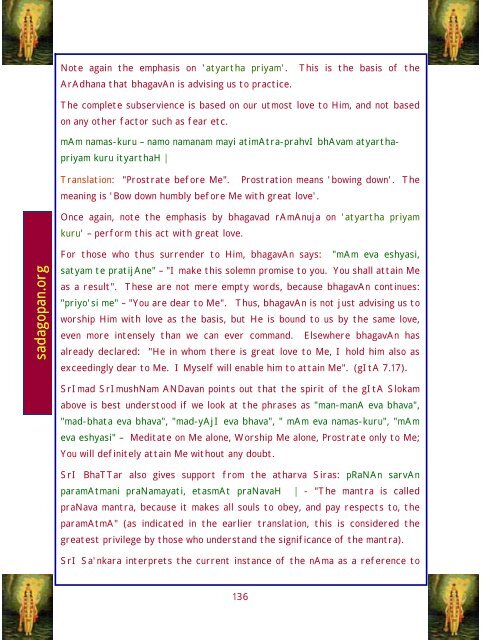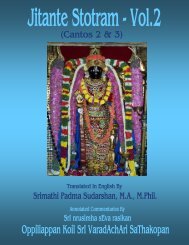- Page 1 and 2:
Volume V
- Page 3 and 4:
CONTENTS SlOkam 96 1 SlOkam 97 16 S
- Page 5 and 6:
. ïI>. . ïImte ramanujay nm>. .
- Page 7 and 8:
Slokam 96 snaTsnatntm> kipl> kiprVy
- Page 9 and 10:
sanAtana-tamaH. SrI BhaTTar comment
- Page 11 and 12:
sAnkhya system of philosophy. (SrI
- Page 13 and 14:
decrease (avayaya), or, b) He exper
- Page 15 and 16:
apyayaH The term apyayaH is made of
- Page 17 and 18:
devotees (svasti-daH), and He also
- Page 19 and 20:
svasti-bhuk because He protects all
- Page 21 and 22:
dakshiNaH because He alone is capab
- Page 23 and 24:
leads to anger; or, when the desire
- Page 25 and 26:
SrI vAsishTha indicates the roots f
- Page 27 and 28:
NammAzhvAr praises and enjoys the g
- Page 29 and 30:
The word 'cakra' also means 'army'
- Page 31 and 32:
with His valor and heroism. He refe
- Page 33 and 34:
18. Courage to fight for the devote
- Page 35 and 36:
"The wind blows out of fear of Him.
- Page 37 and 38:
hetunAm jAtyAdInAm asambhavAt Sabde
- Page 39 and 40:
a) SrI BhaTTar interprets the nAma
- Page 41 and 42:
enemies who are a source of harm to
- Page 43 and 44:
Slokam 98 A³Ur> pezlae d]ae di][>
- Page 45 and 46:
nAma 916. pezl> peSalaH a) He Who i
- Page 47 and 48:
e) He Who destroys His enemies (dak
- Page 49 and 50:
e) One of the alternate interpretat
- Page 51 and 52:
nAma 918. di][> dakshiNaH a) He Who
- Page 53 and 54:
SrI T. S. Krishnamoorthy as "One Wh
- Page 55 and 56:
esponsibility for the protection of
- Page 57 and 58:
nAma 920. ivÖÄm> vidvat vidvat-ta
- Page 59 and 60:
anyone else. This is how the veda-s
- Page 61 and 62:
SravaNam, tathA sva-mukhata uccArya
- Page 63 and 64:
"Lord vishNu, whose nAma-s are puri
- Page 65 and 66:
changes in these whirls of finite m
- Page 67 and 68:
SrI cinmayAnanda's anubhavam is tha
- Page 69 and 70:
covetous inclinations, and he has n
- Page 71 and 72:
nAma 929. sNt> santaH a) He Who mak
- Page 73 and 74:
nammAzhvAr describes bhagavAn as "O
- Page 75 and 76:
dedicated to His thought permanentl
- Page 77 and 78:
Slokam 100 AnNtêpae=nNtïIijRtmNyu
- Page 79 and 80:
as para, vyUhas, etc.; He can be en
- Page 81 and 82:
is mahA purushan. PeriyAzhvAr(2.8.8
- Page 83 and 84:
Perhaps the best example of His con
- Page 85 and 86:
at a bhAgavata's feet, and sent it
- Page 87 and 88:
this nAma. SrI v.v. rAmAnujan gives
- Page 89 and 90:
did not do that. When gajendra scre
- Page 91 and 92: anyway. SrI kRshNan adds that Siva
- Page 93 and 94: sagabhIraH' - He Who is the object
- Page 95 and 96: estows the desired objects to His d
- Page 97 and 98: indra was satisfied that he got his
- Page 99 and 100: In the beginning of nAma 938, it wa
- Page 101 and 102: the Lord, it is not necessarily out
- Page 103 and 104: gives the alternate interpretation
- Page 105 and 106: interpretation for one of these com
- Page 107 and 108: encountered in samsAra which is ful
- Page 109 and 110: comments that through this nAma, bh
- Page 111 and 112: well) na te rUpam na cAkAro nAyudhA
- Page 113 and 114: (refer to the nAma kanakA'ngadI - n
- Page 115 and 116: You, O Being of matchless greatness
- Page 117 and 118: agni, etc.,) obey Him out of sheer
- Page 119 and 120: SrI BhaTTar explains that bhagavAn
- Page 121 and 122: Slokam 102 Aaxarinlyae xata pu:phas
- Page 123 and 124: AdhAra-nilayaH. SrI kRshNan also qu
- Page 125 and 126: hUtAni na vidur-yasya sarvANi bhUtA
- Page 127 and 128: This is the same interpretation tha
- Page 129 and 130: aDit-talamum tAmaraiyE am-kaigaLum
- Page 131 and 132: fast asleep, bestowing all our desi
- Page 133 and 134: patha means path. sat refers to 'ri
- Page 135 and 136: prANan viSodhayati, dApayati iti ki
- Page 137 and 138: marutAm bala dAnAd-hi samudramethan
- Page 139 and 140: It is obvious how both SrI BhaTTar
- Page 141: elationship between us and Him, and
- Page 145 and 146: nAma 958. p[> paNaH a) He Who trade
- Page 147 and 148: agniH pUrvebhiH RshbhiH Idyo nUtana
- Page 149 and 150: gods, and controls them in these fu
- Page 151 and 152: For the current instance of the nAm
- Page 153 and 154: est. Similarly the jIva-s have Him
- Page 155 and 156: detachment, and by His presence He
- Page 157 and 158: and work". prANAya namo yasya sarva
- Page 159 and 160: of the nectar; no, no, You are the
- Page 161 and 162: "One Who knows the truth about Hims
- Page 163 and 164: aLandaPEruyirEyO! Periya nIr paDait
- Page 165 and 166: accrue while they are embodied. Unl
- Page 167 and 168: Slokam 104 ÉUÉuRv>SvStéStar> siv
- Page 169 and 170: of bhagavAn (taru - one that provid
- Page 171 and 172: nAma is derived is tRR - plavanasan
- Page 173 and 174: material things, there is no dedica
- Page 175 and 176: pitAmahaH. The four-faced brahmA is
- Page 177 and 178: tataSca ijyA Ahutir-dvArA poshitAst
- Page 179 and 180: nAma as "One who associates the kar
- Page 181 and 182: SrI vAsishTha explains the nAma as
- Page 183 and 184: nAma 971, and notes that the curren
- Page 185 and 186: itself veda; the hairs of His body
- Page 187 and 188: Slokam 105 y}É&*}k«*}I y}ÉuGy}sa
- Page 189 and 190: nAma 977. y}k«t! yaj~na yaj~na-kRt
- Page 191 and 192: yaj~na-s are performed. SrI v.v. rA
- Page 193 and 194:
sarva yaj~nAnAm bhoktA ca prabhurev
- Page 195 and 196:
SrI satya sandha tIrtha uses the me
- Page 197 and 198:
moksha. In other words, it is the k
- Page 199 and 200:
their diverse anubhavam of how bhag
- Page 201 and 202:
with such deeds, is called yaj~na-g
- Page 203 and 204:
those who thus enjoy Him, and so He
- Page 205 and 206:
itself (Ada) is again derived from
- Page 207 and 208:
Sloka-s, is none other devakI-nanda
- Page 209 and 210:
- He Who mixes the bhakta-s with Hi
- Page 211 and 212:
sa'nkalpam. Repeated reference has
- Page 213 and 214:
as the moon appears in the sky -dev
- Page 215 and 216:
iti vikhAnaH, vikhAna eva vaikhAnaH
- Page 217 and 218:
SrI raghunAtha tIrtha explains the
- Page 219 and 220:
eason, he also chose to not use the
- Page 221 and 222:
Earth. Different anubhavam-s are gi
- Page 223 and 224:
It is very interesting to look at t
- Page 225 and 226:
utter and curd, our sins will be st
- Page 227 and 228:
nAma 993. zŒ É&t! Slokam 107 zŒ
- Page 229 and 230:
5. nandakI - the sword represents b
- Page 231 and 232:
Sa'nkha-bhRte namaH 225 sadagopan.o
- Page 233 and 234:
is the origin of the pa'ncabhUta-s.
- Page 235 and 236:
SrI satyadevo vAsishTha takes a mor
- Page 237 and 238:
epresenting the senses and egotism
- Page 239 and 240:
eaking His own promise not to take
- Page 241 and 242:
apyaham jIvitam jahyAm tvAm vA sIte
- Page 243 and 244:
discharge His responsibility as the
- Page 245 and 246:
carries them so that they will indu
- Page 247 and 248:
that exist only in one region and n
- Page 249 and 250:
loka-trayAdhipatim a-pratima-prabhA
- Page 251 and 252:
Slokam 107 - Additional Comments. A
- Page 253 and 254:
In his vyAkhyAnam for the nAma aksh
- Page 255 and 256:
functions are done only to facilita
- Page 257 and 258:
alone, bhagavAn chooses to use His
- Page 259 and 260:
vanamalee Slokam vnmalI gdI za¼IR
- Page 261 and 262:
SrI vishNu sahasra nAmam - phala Sr
- Page 263 and 264:
vedaNtgae äaü[>Syat! ]iÇyae ivjy
- Page 265 and 266:
xmaRwIR àaßuyaÏmRmwaRwIR cawRma
- Page 267 and 268:
n Éy< Kvictaßaeit vIy¡ tejí ivN
- Page 269 and 270:
durgANyatitaratyASu purushah purush
- Page 271 and 272:
eginning with bhaktimAn etc., the s
- Page 273 and 274:
genders. The grammatical rule state
- Page 275 and 276:
udbhavatvam Aha. SrI bhaTTar provid
- Page 277 and 278:
"vishNu is the unique and unparalle
- Page 279 and 280:
vyAsa". SrI bhaTTar's comment can b
- Page 281 and 282:
SrI Sa'nkara quotes another Slokam



